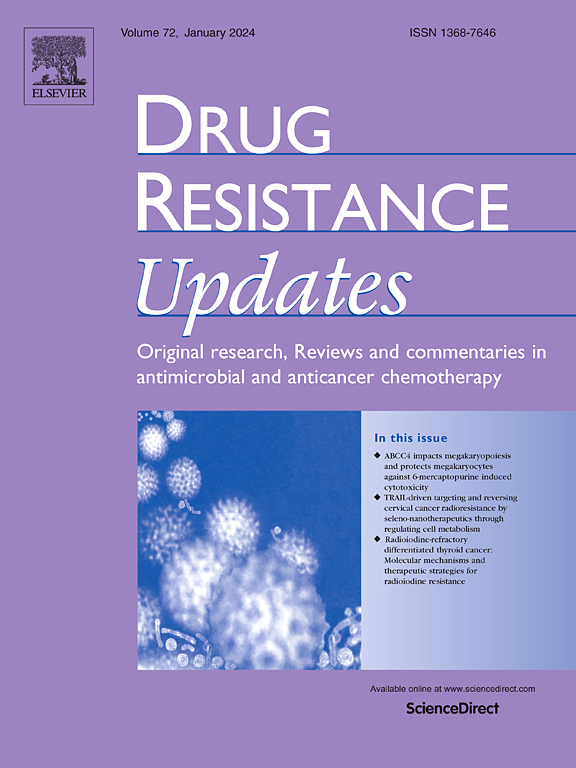肿瘤耐药中的靶向DNA损伤反应途径:机制、临床意义和未来方向
IF 21.7
1区 医学
Q1 PHARMACOLOGY & PHARMACY
引用次数: 0
摘要
靶向DNA损伤反应(DDR)途径已成为克服肿瘤耐药的一种有前景的策略,特别是在DNA修复缺陷的癌症中。DDR通路,包括同源重组(HR)、非同源末端连接(NHEJ)、碱基切除修复(BER)和错配修复(MMR),对维持基因组稳定性至关重要。然而,对ddr靶向治疗的耐药,如PARP抑制剂,往往是由于肿瘤通过各种机制的适应而产生的。这些包括HR通路恢复、DDR蛋白突变、药物代谢改变和代偿修复通路的激活。这篇综述全面分析了肿瘤中DDR耐药的分子机制,并探讨了这些机制在正在进行的治疗策略中的临床意义。我们还讨论了克服DDR耐药的新方法,包括新型DDR抑制剂的开发、联合疗法和基于生物标志物的精准医学方法。此外,我们强调了未来的研究方向,重点是利用先进技术,如CRISPR筛选、单细胞测序和人工智能,发现新的靶点和治疗策略,以对抗ddr相关的耐药。本文章由计算机程序翻译,如有差异,请以英文原文为准。
Targeting DNA damage response pathways in tumor drug resistance: Mechanisms, clinical implications, and future directions
Targeting DNA damage response (DDR) pathways has become a promising strategy for overcoming tumor drug resistance, particularly in cancers with DNA repair defects. DDR pathways, including homologous recombination (HR), non-homologous end joining (NHEJ), base excision repair (BER), and mismatch repair (MMR), are essential for maintaining genomic stability. However, resistance to DDR-targeted therapies, such as PARP inhibitors, often arises due to tumor adaptation through various mechanisms. These include HR pathway restoration, mutations in DDR proteins, altered drug metabolism, and the activation of compensatory repair pathways. This review provides a comprehensive analysis of the molecular mechanisms underlying DDR resistance in tumors and explores the clinical implications of these mechanisms in the context of ongoing therapeutic strategies. We also discuss emerging approaches to overcome DDR resistance, including the development of novel DDR inhibitors, combination therapies, and precision medicine approaches based on biomarkers. Furthermore, we highlight future research directions, focusing on the use of advanced technologies, such as CRISPR screening, single-cell sequencing, and artificial intelligence, to uncover new targets and therapeutic strategies to combat DDR-related drug resistance.
求助全文
通过发布文献求助,成功后即可免费获取论文全文。
去求助
来源期刊

Drug Resistance Updates
医学-药学
CiteScore
26.20
自引率
11.90%
发文量
32
审稿时长
29 days
期刊介绍:
Drug Resistance Updates serves as a platform for publishing original research, commentary, and expert reviews on significant advancements in drug resistance related to infectious diseases and cancer. It encompasses diverse disciplines such as molecular biology, biochemistry, cell biology, pharmacology, microbiology, preclinical therapeutics, oncology, and clinical medicine. The journal addresses both basic research and clinical aspects of drug resistance, providing insights into novel drugs and strategies to overcome resistance. Original research articles are welcomed, and review articles are authored by leaders in the field by invitation.
Articles are written by leaders in the field, in response to an invitation from the Editors, and are peer-reviewed prior to publication. Articles are clear, readable, and up-to-date, suitable for a multidisciplinary readership and include schematic diagrams and other illustrations conveying the major points of the article. The goal is to highlight recent areas of growth and put them in perspective.
*Expert reviews in clinical and basic drug resistance research in oncology and infectious disease
*Describes emerging technologies and therapies, particularly those that overcome drug resistance
*Emphasises common themes in microbial and cancer research
 求助内容:
求助内容: 应助结果提醒方式:
应助结果提醒方式:


